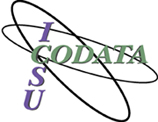International Council for Science : Committee on Data for Science and Technology
![]()
< home > < newsletter > < discussion list > < data science journal > < contact > < members area >
C O D A T A
CODATA Workshop in Tashkent, Uzebekistan, November
3-4, 1998
In response to an invitation from the State Committee of Science and
Technology of the
Republic of Uzbekistan, the Officers of CODATA, accompanied by I)r.
John Rumble,
Executive Committee member, recently spent two days in Tashkent with
twenty two local
scientists exploring how countries in this in this area of central
Asia might become active in
CODATA.
The workshop, held in the headquarters of the Committee, was opened
by Professor Pulat
Khabibullaev, Minister, who welcomed the interest shown by CODATA in
Uzbekistan and
briefly reviewed the backgrounds and expertise of the highly qualified
local scientists in
attendance. With their research programs in such fields. as very high-purity
semiconductors,
molecular-beam epitaxy, crystal preparation, optics and heat physics,
it immediately became
evident that workers in this region are well placed to make significant
contributions to
international data activities, especially in materials-related disciplines.
To acquaint participants with CODATA, each Officer covered a different
aspect. CODATA
President Professor Jacques-Emile Dubois gave a thorough overview highlighting,
some of
CODATA's history and how CODATA has evolved to address changes in data
needs. Dr.
Gordon Wood, Secretary General, explained how Task Groups and Commissions
perform the
scientific work of CODATA and, as an illustration, outlined the objectives
of each of the groups being proposed for renewal or initial approval at
the forthcoming General Assembly. To give a flavour of the breadth of interest
in CODATA and some of the specific data issues addressed, Dr. Michael Chinnery,
Treasurer, reviewed the current list of National Members and spoke of current
concerns with data access in the geosciences. Vice President Fedor Kuznetsov
illustrated how the structure and scientific objectives of the Survey of
Data Sources in Asian-Oceanic Countries Task Group might serve as a model
for a similar Task Group in central Asia. ln addition, he demonstrated
the elements of a proposal for a distributed network of centres in materials
property data that promised to be of particular interest and benefit to
the scientific community of this region. To conclude this session and illustrate
how CODATA operates as the national level, each member of the team briefly
described how the national committees in their respective home countries
(France, Canada, United States and Russia) are organized and how they function.
In the second part of the seminar, a number of the scientists from the
area described some of
their work and outlined their interests in data - covering generation,
standards and access. In
a short report it is possible to highlight only a few of the presentations.
Academician Nikolai Lezhnev of the Academy of Sciences of Turkmenistan
spoke of their
work ranging from surface-active substances for oil extraction from
depleted wells to acoustics of complex multi-component system~ to the extraction
of natural products fromplants. Professor A. T. Mamadalimov, Heat Physics
Department of the Uzbekistqn Academy of Sciences, described the ongoing
studies of the effects of impurities and doping on semiconductor properties.
They have 30 years of data available, much of which is not available yet
in the literature, and are interested in working with CODATA on critical
evaluation. The study of the interactions of laser beams with high purity
( 1 part in 105) media, in which they observed luminescence
in the range of the materiaJ's optical transparency, was outlined by or.
M. A. Casimdjanov, also of the Heat Physics Department. As they perfect
their techniques, they expect one very practical application to be the
characterization, both in Magnitude and distribution, of impurities in
optical fibres. The need for access to data was highlighted in the presentation
by Prof. V. I.Matveev. Their theoretical work on calculating yields of
primary and secondary collision products in ion beam implantation and sputtering
is impeded by a lack of data and they see CODATA possibly being able to
help. Dr. D. U.Matrasulov, representing a group of theorists in the Heat
Physics Department, mentioned some of their wide-ranging da~ta interests:
non-linear processes in atomic physics, cosmic ray interactions with the
ozone layer and biosphere; spreading of salt through the soil. Desertification
and agriculture were clearly topics of considerable interest to the region.
The crowning touch of the sessions was the signing of a protocol by
Minister Khabibullaev
and Prof. Dubois in which Uzbekistan declared its interest in pursuing
an ongoing relationship with CODATA. It remains to be determined whether
Uzbekistan will join as a National Member or as the lead country in a Central
Asia Regional Member, the latter being a new category of membership being
proposed for approval at the 1998 CODATA General Assernbly.
G. H. Wood
8 November 1998
Working to improve the quality, reliability, management and accessibility of Data for Science and Technology
| home
| about
| codata membership
| resources
| task and working groups
|
| archives | newsletter | contact
| members area |
| ![]() | RSS Feed subscription instructions |
| RSS Feed subscription instructions |
